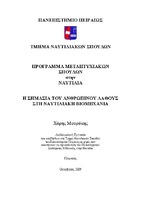Η σημασία του ανθρώπινου λάθους στη ναυτιλιακή βιομηχανία

Master Thesis
Author
Μαυράκης, Χάρης
Date
2012-04-04View/
Abstract
The human element has long been recognized as important to marine safety therefore human error plays an important role in the genesis of accidents. Investigations have revealed that the human factor contributes to the vast majority of marine casualties. This can be taken both ways. More people, more accidents or more people with better competence, less accidents. The effort of the industry to decrease accidents at sea is concentrated on the study of the human element and its variability so as to identify the factors that undermine human performance onboard ships and lead to errors. Accidents at sea can be separated into those caused directly by the crew members such as fatigue, stress, and communication problems or indirectly such as shipping companies' policies to reduce manning costs, shortage of qualified officers and developing technology. According to the possible causes of human error, fatigue was found to be an important and at the same time risky factor which can severely affect sea safety. Risk is an inherent part of the maritime industry and can never be completely eliminated. However, placing emphasis on people, both operators and managers of ships, enhancing their training and ensuring that they are properly qualified, is the most effective way to enhance safety and reduce this risk. Human element remains a basic component with all its strengths and weaknesses which can both cause a disaster or prevent it. As Mr W.A. O'neil, ex-Secretary-General of IMO states: "Our task is to sort out the issues, build on the strengths and correct the weaknesses of human element".


